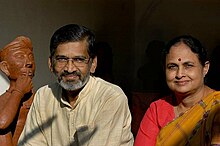This article has multiple issues. Please help improve it or discuss these issues on the talk page. (Learn how and when to remove these messages)
|
Abhay and Rani Bang | |
|---|---|
 | |
| Born | |
| Nationality | Indian |
| Alma mater | Government Medical College and Hospital, Nagpur (MBBS, MD) Johns Hopkins University (MPH) |
| Occupation | Social activists |
| Known for | Social work, community health, de-addiction, home based newborn care |
| Children | Anand Bang (elder), Amrut Bang (younger) |
| Awards |
|
| Honours | Padma Shri |
Abhay Bang and Rani Bang are Indian activists and community health researchers working in the Gadchiroli district of Maharashtra, India.
Together, they have developed initiatives and programmes intended to reduce infant mortality rates. Their initiatives have been endorsed by the World Health Organization (WHO) and UNICEF for work carried out across India and in parts of Africa.[1][2] Abhay and Rani Bang also founded the non-profit Society For Education, Action and Research in Community Health (SEARCH), which is involved in rural health service and research.
They won the Maharashtra Bhushan Award,[3] and have been awarded honorary doctorates from the Sanjay Gandhi Postgraduate Institute of Medical Sciences at Lucknow.[4] SNDT Women's University, Mumbai has also awarded honoris causa to Rani Bang.[5] The Lancet described the couple as "the pioneers of health care in rural India".[6] Abhay and Rani Bang were the first recipients of the Distinguished Alumni Award from the Department of International Health at the Johns Hopkins Bloomberg School of Public Health. They were also inducted into the Johns Hopkins Society of Scholars, for their leadership in community-based health care that is helping to save the lives of millions of newborns and children. During their careers, the Bangs have helped foster a renaissance in community-based primary health care.[7] In 2016, Johns Hopkins University conferred the Distinguished Alumni Award upon them.[8]
- ^ Day, Elizabeth (20 March 2011). "Dr Abhay Bang: the revolutionary paediatrician". The Guardian. Retrieved 28 November 2012.
- ^ "Save the Children UK | International Children's Charity" (PDF).
- ^ Bang, Abhay T; Bang, Rani A; Baitule, Sanjay B; Reddy, M Hanimi; Deshmukh, Mahesh D (4 December 1999). "Effect of home-based neonatal care and management of sepsis on neonatal mortality: field trial in rural India". The Lancet. 354 (9194): 1955–1961. doi:10.1016/s0140-6736(99)03046-9. PMID 10622298. S2CID 27157242. Retrieved 17 June 2014.
- ^ "PGI ने मनाया 20वां दीक्षांत समारोह, वीमेन हेल्थ इश्यूज पर हुई चर्चा". www.bhaskar.com. 27 September 2015. Archived from the original on 4 March 2016.
- ^ "S.N.D.T. Women's University". sndt.ac.in. Archived from the original on 21 January 2013.
- ^ "The Lancet honour for Bang couple". The Times of India. 13 January 2011.
- ^ "Alumni Award". www.jhsph.edu. Archived from the original on 28 July 2013.
- ^ लोकसत्ता टीम (2 April 2016). "डॉ. राणी व डॉ. अभय बंग यांना जॉन्स हॉपकिन्स विद्यापीठाचा पुरस्कार". Loksatta (in Marathi). Retrieved 15 June 2022.